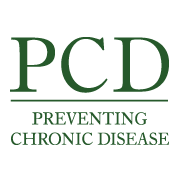PCD News Summary for November 23, 2016

About the Journal
Published every Thursday, Preventing Chronic Disease (PCD) is a peer-reviewed online journal established by CDC’s National Center for Chronic Disease Prevention and Health Promotion. The News Media Branch prepares press summary packets each week. To receive these press summaries on an embargoed basis, send an e-mail to media@cdc.gov. Please note that this e-mail list is for credentialed journalists only. All others, please visit Hookup to Health to sign up for e-mail updates
Notice to News Media - PCD Release Time and Embargo Policy:
CDC’s News Media Branch releases to reporters the PCD media packet every Tuesday afternoon between 12 and 2 pm.
Burden of Multiple Chronic Conditions in Delaware, 2011–2014
Melissa Newton
mnewton@cdc.gov
404-718-6281
More than 65 percent of Delaware adults had at least one chronic condition, and nearly 37 percent of Delaware adults had multiple chronic conditions during 2011-2014. The arthritis/obesity dyad and the arthritis/high blood pressure/high cholesterol triad were the two most prevalent multiple chronic condition combinations among Delaware adults surveyed from 2011 through 2014. The findings of this study can help state health care providers and regional policy makers in coordinating and managing care for people with multiple chronic conditions.
Diversion Alert: 1-Year Evaluation Across Northern New England, 2013–2014
Melissa Newton
mnewton@cdc.gov
404-718-6281
A new online drug-arrest data tool may be an effective way to complement Prescription Drug Monitoring Program data and help prevent misuse and diversion of opioid medications. Diversion Alert is a unique online tool that provides drug-arrest data to medical professionals, allowing them to identify and respond to patients at-risk for overdose, in need of treatment, or engaged in illegal drug distribution. For this study, researchers compared 2013-2014 Diversion Alert program survey data from Maine to survey data from the neighboring states of New Hampshire and Vermont, which do not have Diversion Alert programs. In Maine, there were significant improvements in communication between providers and collaboration with patients through patient agreements (contracts), screening to guide prescribing and treatment decisions, and more conservative prescribing procedures to limit illegal use and diversion for patients who have been arrested.
###
- Page last reviewed: November 23, 2016
- Page last updated: November 23, 2016
- Content source:
Error processing SSI file


 ShareCompartir
ShareCompartir